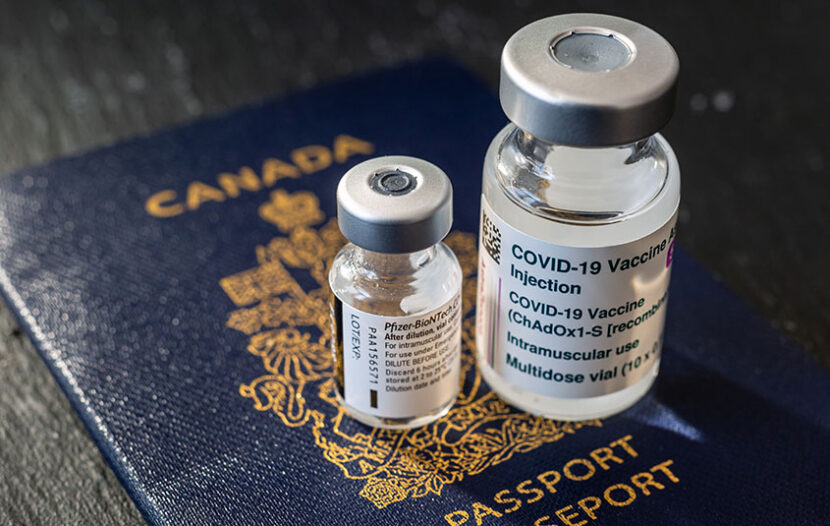TORONTO — A strong majority of Canadians favours proof of vaccination, better known as vaccine passports or vaccination certificates, for travel outside Canada.
That bodes well for restarting the travel industry, and it’s in line with initiatives from the EU, where the Digital Green Pass recently got the green light with a potential July 1 start date.
But what if countries and regions around the world forge ahead with vaccination certification, without effective digital solutions at airports to process those credentials?
If that happens, time spent at the airport could reach 5.5 hours per trip at 75% pre-COVID-19 traffic levels – and 8 hours per trip at 100% pre-COVID-19 traffic levels, according to new projections from IATA.
MAJORITY OF CANADIANS ONBOARD WITH VACCINATION CERTIFICATES
Three-quarters of Canadians (76%) say they’re in favour of vaccine passports for cross-border travel to the U.S. And an even higher percentage (79%) say vaccine passports are a good idea for international travel.
Those results come from a just released Angus Reid poll.
Just over half (51%) of Canadians maintain that the Canada-U.S. border closure should remain in place for the time being. However as the analysis from Angus Reid notes, Canadians who travelled regularly before the pandemic were far more likely to say that the Canada-U.S. border should have been opened after the May 24 long weekend (37%) compared to those who did not take any international trips from 2018 to 2020 (16%). Overall, 48% say they would keep the border closed until September.
The survey also polled Canadians’ stance on proof of vaccination for things like going to public places in the community, eg. restaurants, movies and the like, and for the workplace. The acceptance for vaccine passports is considerably higher for travel, with 55% saying they were in favour for mandatory proof of vaccination for public places in the community, and for workplaces.
“NOBODY WILL TOLERATE WAITING HOURS AT CHECK-IN OR FOR BORDER FORMALITIES”
A revised forecast by IATA and Tourism Economics shows there’s reason for optimism for travel as the world emerges from the pandemic.
According to IATA…
- In 2021 global passenger numbers are expected to recover to 52% of pre-COVID-19 levels (2019).
- In 2022 global passenger numbers are expected to recover to 88% of pre-COVID-19 levels.
- In 2023 global passenger numbers are expected to surpass pre-COVID-19 levels (105%).
- By 2030 global passenger numbers are expected to have grown to 5.6 billion. That would be 7% below the pre-COVID-19 forecast and an estimated loss of 2-3 years of growth due to COVID-19.
However IATA is warning of potential airport chaos unless governments move quickly to adopt digital processes to manage travel health credentials (COVID-19 testing and vaccine certificates) and other COVID-19 measures.
The impacts will be severe, says IATA…
- Pre-COVID-19, passengers, on average, spent about 1.5 hours in travel processes for every journey (check-in, security, border control, customs, and baggage claim).
- Current data indicates that airport processing times have ballooned to 3 hours during peak time with travel volumes at only about 30% of pre-COVID-19 levels. The greatest increases are at check-in and border control (emigration and immigration) where travel health credentials are being checked mainly as paper documents.
- Modelling suggests that, without process improvements, the time spent in airport processes could reach 5.5 hours per trip at 75% pre-COVID-19 traffic levels, and 8 hours per trip at 100% pre-COVID-19 traffic levels.
“Without an automated solution for COVID-19 checks, we can see the potential for significant airport disruptions on the horizon. Already, average passenger processing and waiting times have doubled from what they were pre-crisis during peak time – reaching an unacceptable three hours. And that is with many airports deploying pre-crisis level staffing for a small fraction of pre-crisis volumes. Nobody will tolerate waiting hours at check-in or for border formalities. We must automate the checking of vaccine and test certificates before traffic ramps-up. The technical solutions exist. But governments must agree digital certificate standards and align processes to accept them. And they must act fast,” said Willie Walsh, IATA’s Director General.
Not surprisingly, despite the myriad challenges airlines have faced over the past 15 months, and continue to face, Walsh is bullish on aviation and the travel industry. Sustainability is key, however.
“I am always optimistic about aviation,” he said. “We are in the deepest and gravest crisis in our history. But the rapidly growing vaccinated population and advancements in testing will return the freedom to fly in the months ahead. And when that happens, people are going to want to travel. The immediate challenge is to reopen borders, eliminate quarantine measures and digitally manage vaccination/testing certificates. At the same time, we must assure the world that aviation’s long-term growth prospects are supported with an unwavering commitment to sustainability. Both challenges require governments and industry to work in partnership. Aviation is ready. But I don’t see governments moving fast enough.”

